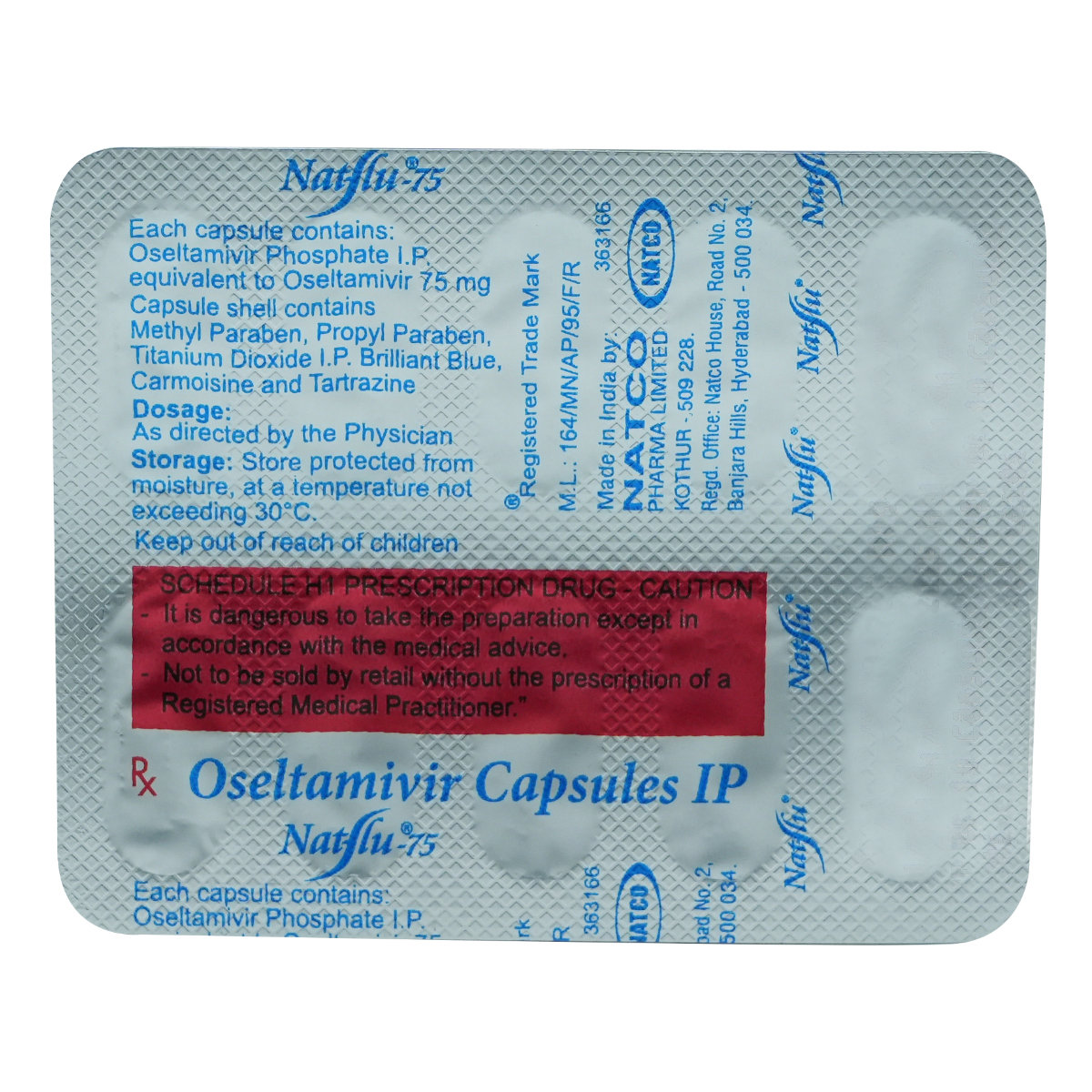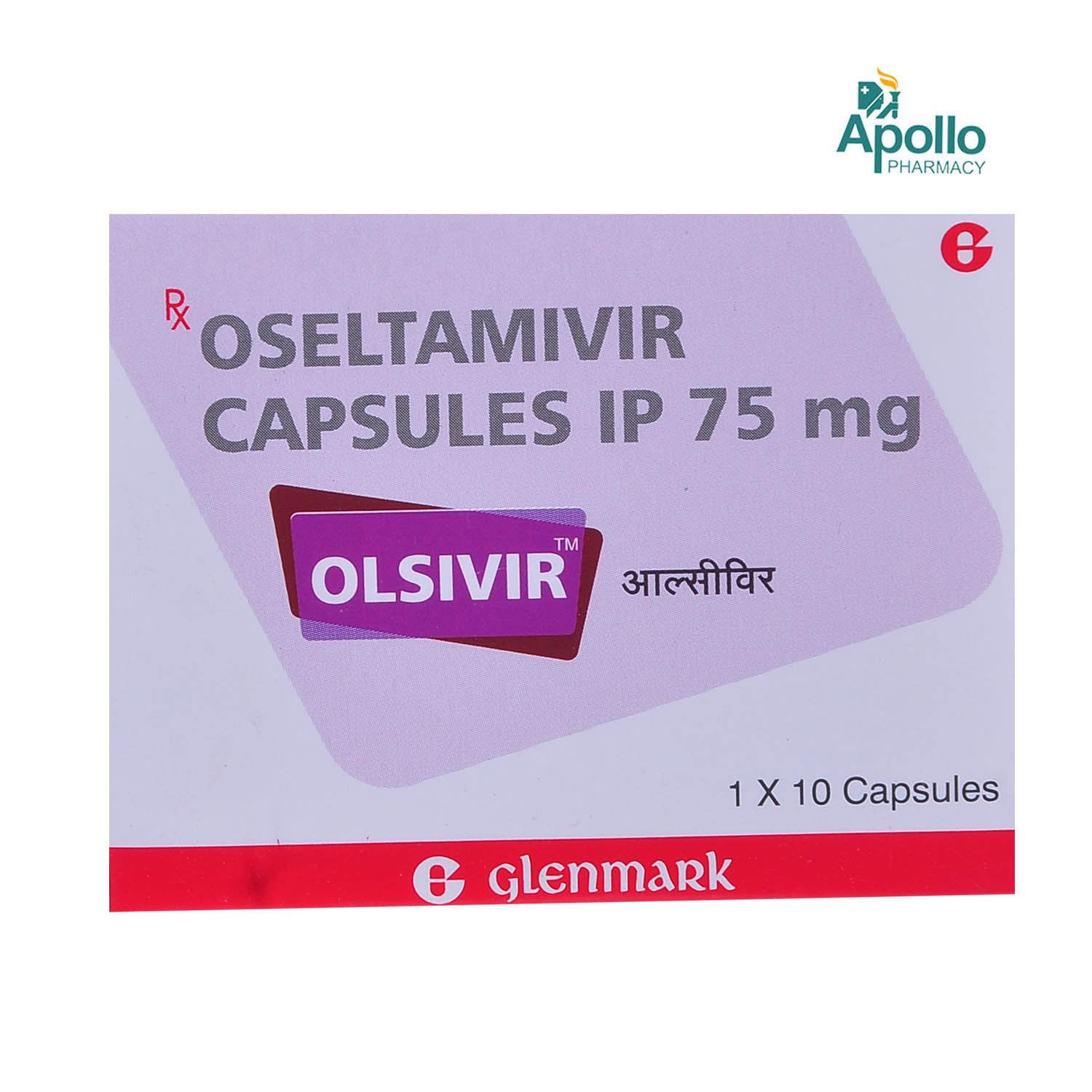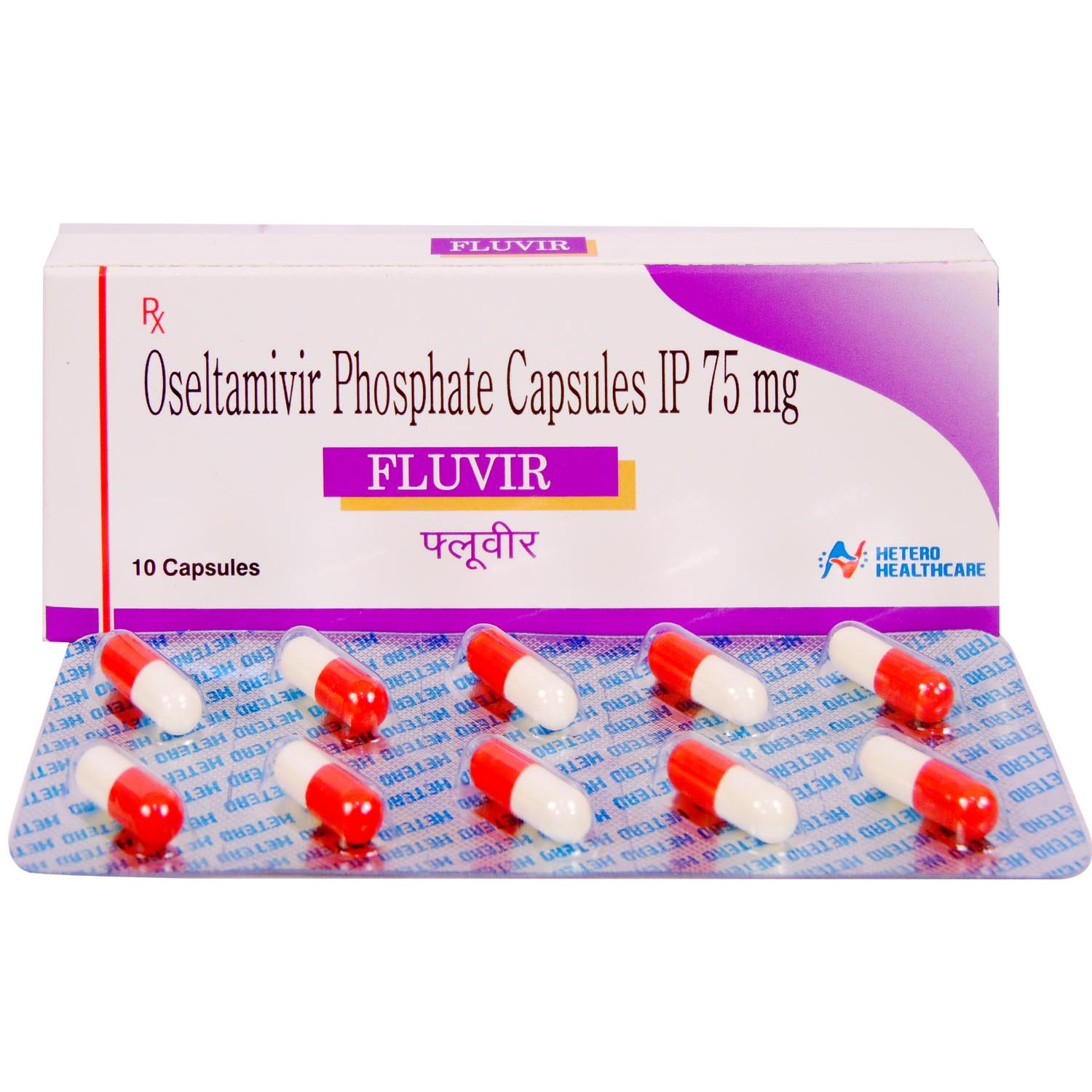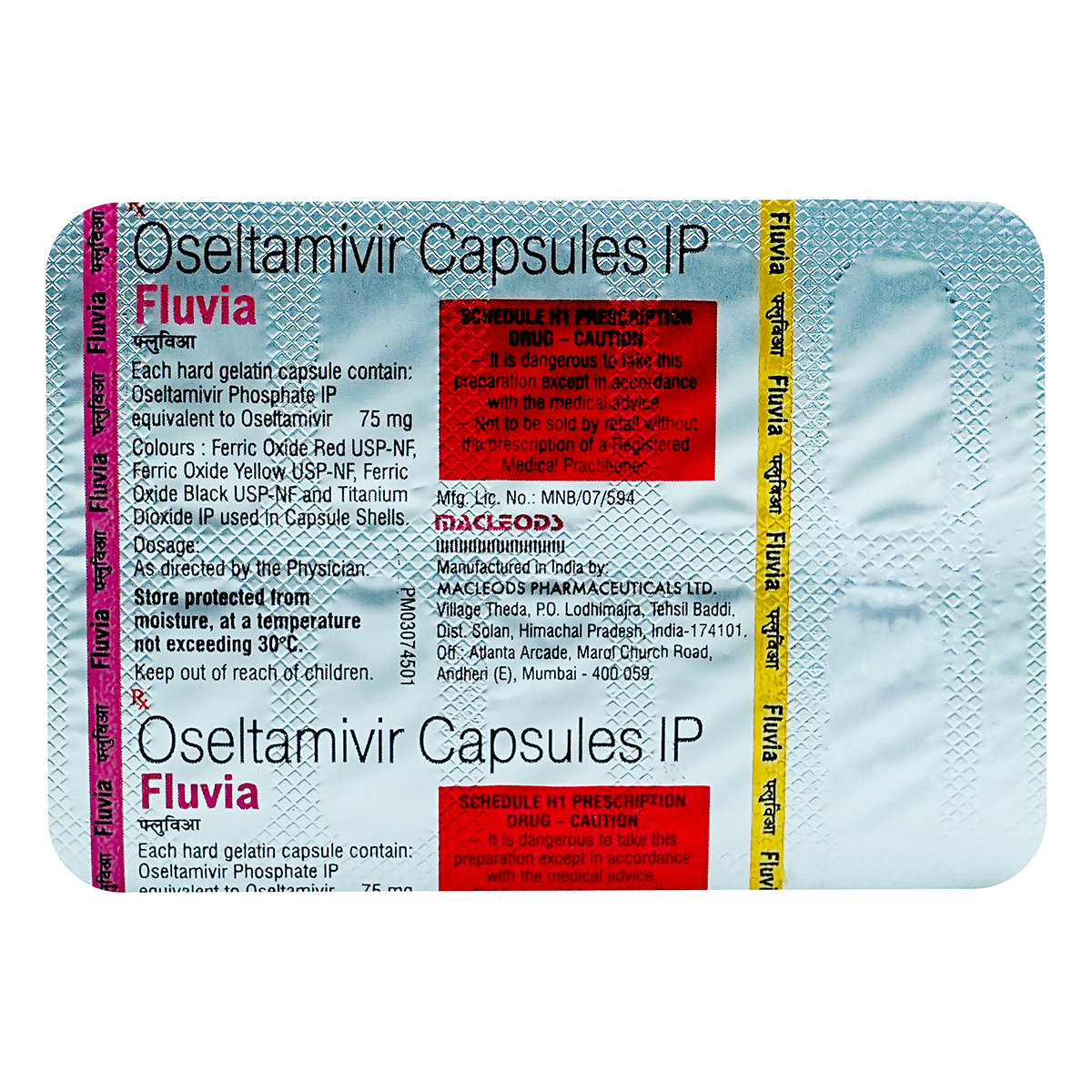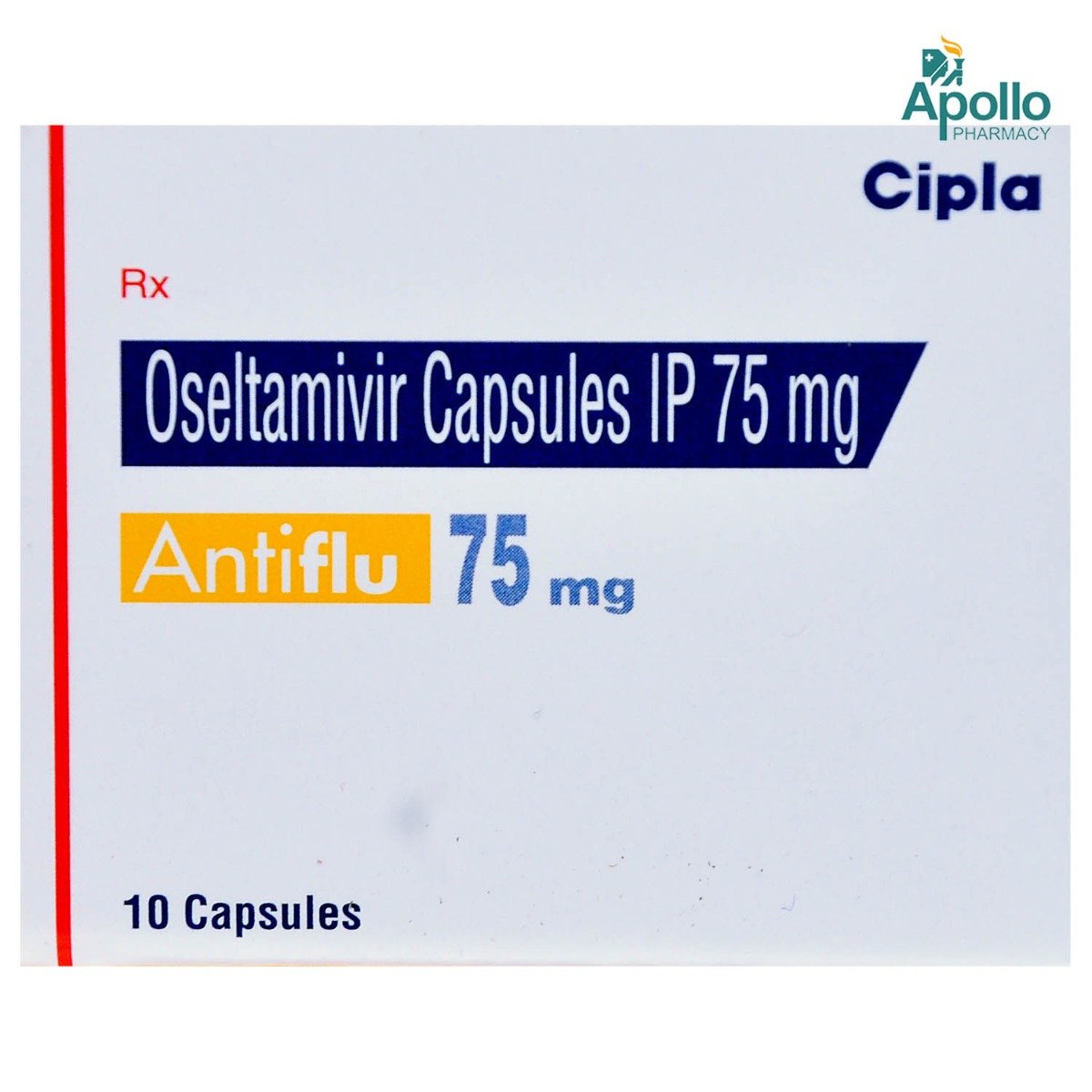Flucover Capsule 10's
MRP ₹600
(Inclusive of all Taxes)
₹90.0 Cashback (15%)
Provide Delivery Location
Online payment accepted
 Prescription drug
Prescription drugWhats That
Composition :
Manufacturer/Marketer :
Consume Type :
Expires on or after :
Return Policy :
About Flucover Capsule
Flucover Capsule contains a class of antiviral medication, oseltamivir, which is used to treat viral infections. It plays a vital role in treating symptoms caused by the influenza virus. It is used to treat cough, stuffy nose, sore throat, chills/fevers, and tiredness. The flu is caused by the influenza virus, which infects the lungs, throat, and nose. Influenza is a severe disease. Several diseases that keep people at higher risk include asthma, liver and kidney disease, heart disease, diabetes. Flucover Capsule contains oseltamivir, which is an antiviral medication. It blocks the enzyme present on the surface of a virus that helps the viruses enter uninfected cells of the body to cause influenza infection in the body. As a result, this stops the proliferation of viruses and produces new viruses, slowly leading to the viral infection clearing up.
Influenza or flu is produced by a virus that causes respiratory disease. It is highly infectious and easily spreads through the sneezes and coughs of an infected person. Influenza can be transmitted easily through touch. Adults can start circulating the virus 2 days before the symptoms start showing up. They can spread it for up to 7 days from the day they become sick. This means that you can stop spreading the influenza virus route before figuring out that you are ill.
Take Flucover Capsule as prescribed by your doctor. You are advised to take Flucover Capsule for as long as your doctor has prescribed it for you depending on your medical conditions. In some cases, you may experience nausea, abdominal pain, vomiting, and diarrhoea. Most of these side effects of Flucover Capsule are temporary, do not require medical attention, and gradually resolve over time. However, if the side effects are persistent, reach out to your doctor.
Consume only if the doctor prescribes you. Never encourage self-medication or suggest your medicine to someone else. Do not take Flucover Capsule if you are allergic to Flucover Capsule . Before using this Flucover Capsule , inform your doctor if you have suicidal thoughts, confusion, and kidney diseases. If you have a weak immune system, please inform your doctor before taking Flucover Capsule as a dose adjustment may be required.
Uses of Flucover Capsule
Directions for Use
Key Benefits
Flucover Capsule contains a class of antiviral medication, oseltamivir, which is used to treat viral infections. It blocks the enzyme present on the surface of the virus that helps the viruses enter uninfected cells of the body to cause influenza infection in the body. As a result, this stops the proliferation of viruses and produces new viruses, slowly leading to the viral infection clearing up.
Storage
- Drink water or other clear fluids.
- To prevent worsening of pain, limit intake of tea, coffee, or alcohol.
- Include bland foods like rice, toast, crackers, and rice in your diet.
- Avoid lying down immediately after eating as it may cause indigestion or heartburn.
- Avoid acidic and spicy food as it may cause indigestion.
- Using a cold compress may help relieve itching and inflammation associated with conjunctivitis.
- A warm compress and washing the eyes with water can help with crusting on the eyelids.
- Avoid wearing contact lens until you feel better; use spectacles instead.
- Do not rub the eyes.
- Practise good hand hygiene and avoid touching the eyes to prevent the spread of infection.
- Avoid using cotton swabs/pins as they can push wax deeper into your ear.
- Use earwax softener drops to remove ear war.
- Seek medical attention if you experience severe ear pain, fever, or discharge.
- A warm compress on the affected ear can help ease the pain.
- Try the popping technique by pinching your nose shut, closing your mouth, and blowing gently.
- Practice relaxation techniques like meditation and deep breathing.
- Use white noise machines or earplugs to mask the ringing.
- Sleep with your head elevated to reduce middle ear pressure.
- Chewing gum helps balance ear pressure by stimulating the Eustachian tube.
- Avoid using earphones/headphones and limit exposure to loud sounds.
- If you experience nosebleeds or unusual bleeding after taking medication, seek medical attention right away and schedule an appointment to discuss your symptoms with your doctor.
- Your doctor may adjust your treatment plan by changing the dosage, switching to a different medication, or stopping the medication.
- If your doctor advises, take steps to manage bleeding and promote healing, such as applying pressure, using saline nasal sprays, or applying a cold compress, using humidifiers, avoiding blowing or picking your nose, and applying petroleum jelly to the nostrils.
- Schedule follow-up appointments with your doctor to monitor progress, adjust treatment plans, and prevent future episodes.
- Prepare for a restful night's sleep: Develop a calming pre-sleep routine, like reading or meditation, to help your body relax and prepare for sleep.
- Create a sleep-conducive Environment: Make bedroom a sleep haven by ensuring it is quiet, dark and calm.
- Follow a Sleep Schedule: Go to bed and get up at the same time every day to help regulate your body's internal clock and increase sleep quality.
- Try relaxing techniques like deep breathing, mindfulness meditation and any others.
- Limit stimulating activities before bedtime: Avoid stimulating activities before bedtime to improve sleep quality.
- Monitor Progress: Keep track of your sleep patterns to identify areas for improvement.
- Consult a doctor if needed: If these steps don't improve your sleep, consult a doctor for further guidance and therapy.
- Inform your doctor about the nausea and discuss possible alternatives to the medication or adjustments to the dosage.
- Divide your daily food intake into smaller, more frequent meals to reduce nausea.
- Opt for bland, easily digestible foods like crackers, toast, plain rice, bananas, and applesauce.
- Avoid certain foods that can trigger nausea, such as fatty, greasy, spicy, and smelly foods.
- Drink plenty of fluids, such as water, clear broth, or electrolyte-rich beverages like coconut water or sports drinks.
- Use ginger (tea, ale, or candies) to help relieve nausea.
- Get adequate rest and also avoid strenuous activities that can worsen nausea.
- Talk to your doctor about taking anti-nausea medication if your nausea is severe.
- Record when your nausea occurs, what triggers it, and what provides relief to help you identify patterns and manage your symptoms more effectively.
- Preventing Vomiting (Before it Happens)
- Take medication exactly as prescribed by your doctor. This can help minimize side effects, including vomiting.
- Having a small meal before taking your medication can help reduce nausea and vomiting.
- Talk to your doctor about taking anti-nausea medication along with your prescribed medication.
- Managing Vomiting (If it Happens)
- Try taking ginger in the form of tea, ale, or candy to help alleviate nausea and vomiting.
- What to Do if Vomiting Persists
- Consult your doctor if vomiting continues or worsens, consult the doctor for guidance on adjusting your medication or additional treatment.
Drug Warnings
Do not take Flucover Capsule if you are allergic to Flucover Capsule . Before using this Flucover Capsule , inform your doctor if you have suicidal thoughts, confusion, and kidney diseases. If you have a weak immune system, please inform your doctor before taking Flucover Capsule as a dose adjustment may be required. Flucover Capsule may cause dizziness, lightheadedness, and fainting when you get up too quickly from a lying position, especially when you start taking Flucover Capsule so please get up gradually. Also, do not drive a car or operate any machinery which requires concentration as Flucover Capsule may cause dizziness. If you have a weak immune system, please inform your doctor before taking Flucover Capsule as a dose adjustment may be required. Drink plenty of fluid as Flucover Capsule can cause dehydration and kidney damage.
Drug-Drug Interactions
Drug-Drug Interactions
Login/Sign Up
Drug-Food Interactions
Drug-Food Interactions
Login/Sign Up
Diet & Lifestyle Advise
- Take it with food to avoid stomach upset.
- Avoid alcoholic beverages with Flucover Capsule as it can make you dehydrated and may affect your sleep.
- Try to include heart-healthy omega 3 fatty acid containing food drinks in your daily diet. You can also use low-fat cooking oil like olive oil, soybean oil, canola oil, and coconut oil.
- Include turmeric or yellow mustard in your diet to avoid constipation caused by antiviral drugs and increase the intake of fluids to stay hydrated.
Side Effects of Flucover Capsule
Like all medicines, Flucover Capsule can cause side effects, although not everybody gets them. The most common side-effects are nausea, abdominal pain, vomiting, and diarrhoea. Most of these side effects do not require medical attention and gradually resolve over time. However, if the side effects are persistent, reach out to your doctor.
Habit Forming
Therapeutic Class
All Substitutes & Brand Comparisons
RX
Not for online saleNatflu 75mg Capsule 10's
Natco Pharma Ltd
₹515.5
(₹46.4 per unit)
14% CHEAPERRX
Out of StockNot for online saleOselow 75 mg Capsule 10's
Msn Laboratories Pvt Ltd
₹520
(₹46.8 per unit)
13% CHEAPERRX
Out of StockNot for online saleOlsivir Capsule 10's
Glenmark Pharmaceuticals Ltd
₹535
(₹48.15 per unit)
10% CHEAPER
Drug-Diseases Interactions
Drug-Diseases Interactions
Login/Sign Up
FAQs
Drug-Drug Interactions Checker List
- METHOTREXATE
- WARFARIN
Special Advise
Disease/Condition Glossary
Influenza: Influenza or flu is produced by a virus that causes respiratory disease. It is highly infectious and easily spreads through the sneezes and coughs of an infected person. Influenza can be transmitted easily through touch. Adults can start circulating the virus 2 days before the symptoms start showing up. They can spread it for up to 7 days from the day they become sick. This means that you can stop spreading the influenza virus route before figuring out that you are ill. Influenza or flu is produced by a virus that causes respiratory disease. It is highly infectious and easily spreads through the sneezes and coughs of an infected person. Influenza can be transmitted easily through touch. Adults can start circulating the virus 2 days before the symptoms start showing up. They can spread it for up to 7 days from the day they become sick. This means that you can stop spreading the influenza virus route before figuring out that you are ill. Symptoms of influenza include blocked or runny nose, sore throat, cough, and headache. Several other symptoms include high temperature, shivers, cold sweat, nausea, diarrhoea, and vomiting. In most cases, influenza is not serious, while, in some cases, flu can cause severe complications. This is more expected to occur in older people, young children, and people with a long-lasting disease that can compromise their immune system.

Have a query?
Alcohol
Safe if prescribed
Alcohol is not known to cause any unpleasant side effects if taken along with Flucover Capsule . But intake of alcohol with Flucover Capsule may damage your liver. So intake of Flucover Capsule should be avoided with Flucover Capsule .
Pregnancy
Consult your doctor
Flucover Capsule is a pregnancy Category C medicine. It is not known whether Flucover Capsule will affect pregnant women or fetus or not. However, the intake of Flucover Capsule should not be associated with an increased risk of congenital disabilities.
Breast Feeding
Consult your doctor
Very few active parts of Flucover Capsule pass into the milk, but it gives a therapeutic effect to the baby.
Driving
Safe if prescribed
Flucover Capsule can affect alertness and coordination. So, operating machinery which requires concentration should be avoided.
Liver
Consult your doctor
Not safe because Flucover Capsule has interaction with liver disease.
Kidney
Consult your doctor
Not safe because Flucover Capsule has interaction with kidney disease.
Children
Safe if prescribed
The safety and efficacy of Flucover Capsule in children have not been established. Hence, contact your doctor.




